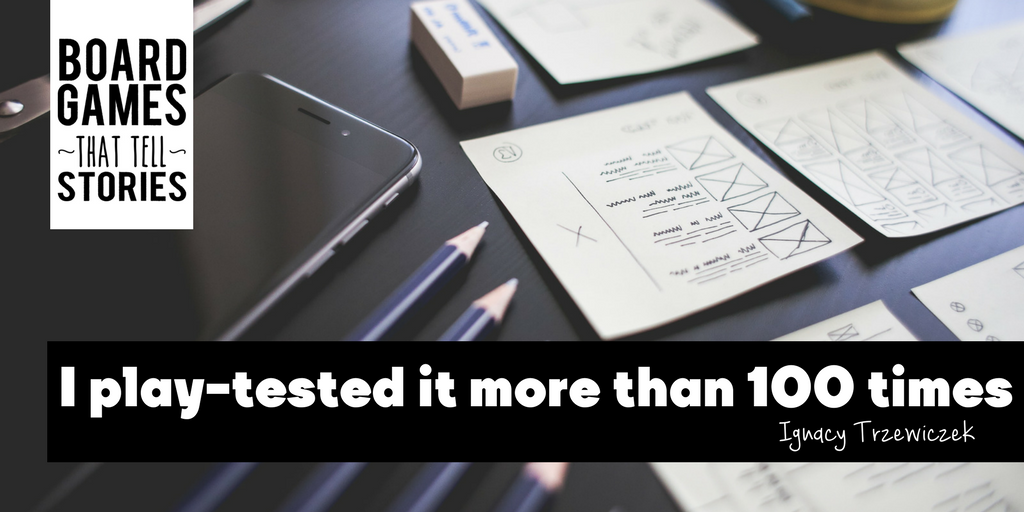
‘I play-tested it more than 100 times’.
No, you probably didn’t. You played it 100 times, but playing is not play-testing.
Shall we begin?
***
I receive many emails from young designers and see the same phrase everywhere. ‘I play-tested it more than 100 times.’ This is a sentence I read in so many submissions.
First of all, 100 gameplays are actually not as many as it sounds. Sorry to say that. 8 games of Robinson in a single day, every damn day of a long week? I’ve been there. 10 or 15 games of Imperial Settlers over one weekend, over and over again? Yep, regular stuff for me.
100 games is not enough, it is not a number you are looking for if the game is complex and you need to balance it.
But the number doesn’t matter. It’s not the game of numbers. It’s the game of quality.
***
Play-testing means work. It is a goal-oriented game session. It is a task with a precise outcome. It is playing a game for a purpose.
You cannot start a play-testing session without knowing what you are testing. You must exactly know what you are checking that day. What question you are looking to answer. It’s not about: ‘Let’s play, and we see how it goes’, it’s always about: ‘Let’s play and check if strategy XXX is valid’ or ‘Let’s play and see how it works without this rule,’ or ‘Let’s play it and see if adding more event cards makes the game longer.’
If you are not experienced yet, write the question on a piece of paper. Write down what you want to know after the test.
And when the test is finished, either you have the answer to the question you wrote down an hour before, or you don’t have it and you need to playtest again, and again, and again. Until you get your damn answer.
Questions and answers. Without that, without a goal of a particular test, you are not play-testing. You are just playing.
***
What about play-testers? Depending on your goal, you tell them openly what you are doing today or you don’t reveal it at all.
Examples?
You tell your play-testers that today you:
– test if a particular strategy is the winning one (guys, please, today try to play a strong money strategy),
– test if you can build an interesting strategy with the new cards you added (here are a couple of new abilities; please, today use them as heavily as you can),
– test if there is something you want to compare and want them to pay attention to (please focus on combat today, because I really need to see how it compares to the previous version),
You never tell your play-testers that today you:
– are checking if the game is too long,
– are checking if the game is less interesting after you removed some minor rules,
– are checking which rules are confusing for the players
In general, if you balance the game, you say it openly to play-testers and ask them to focus and do their best to find the best winning strategy. You agree to some cheating, like: ‘Let’s assume I got this card in the first round and these two cards in the second round. I think this might be crazy strong.’ Go for it. Agree. Give them all they ask for and let them prove that some synergies are crazy.
In general, if you check if the game is smooth, if the experience is great, if the gameplay is right, you shut up and just watch the players play. Don’t tell them that you want to see if they feel comfortable. Just watch them. You’ll see it anyway.
***
I had this awkward moment yesterday. You know, last year we moved to a new office in another city. With the new location came a bunch of new play-testers. They don’t know me that well yet. They don’t know the way I roll yet. They must learn what play-testing means.
Yesterday, after the game was done:
‘This cash-in action was…’ the guy began.
‘We were not play-testing that.’ I shut him down. At that very moment, I probably sounded like the biggest jerk ever.
But yesterday I was checking how factions influence the strategy of play. I didn’t say that to the testers, it was something I needed to check without them knowing the purpose. I didn’t care what their opinions about the game flow or the cash action were. That was established many games before and I’d been very satisfied with it for weeks. That’s why I shut the guy down before he even began.
I might know how to play-test the games. I do, however, lack the communication skills. Anyone runs a blog about that? I’d love to learn.
 Polski
Polski English
English Deutsch
Deutsch


